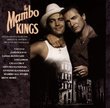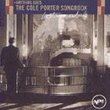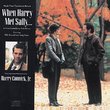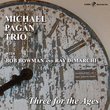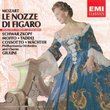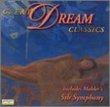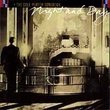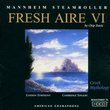| All Artists: James P Johnson Title: 1942-45 Members Wishing: 3 Total Copies: 0 Label: Smithsonian Folkways Original Release Date: 9/24/1996 Release Date: 9/24/1996 Genres: Jazz, Pop Style: Traditional Jazz & Ragtime Number of Discs: 1 SwapaCD Credits: 1 UPC: 093074081228 |
Search - James P Johnson :: 1942-45
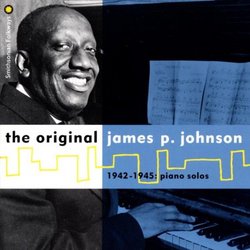 | James P Johnson 1942-45 Genres: Jazz, Pop
Seventy-four minutes of solo piano from the father of Harlem stride piano. Includes eight previously unreleased tracks, including Yamekraw and Jazzamine Concerto. 20 vibrant performances, including Joplin and Handy, a Gers... more » |
Larger Image |
CD DetailsSynopsis
Album Description Seventy-four minutes of solo piano from the father of Harlem stride piano. Includes eight previously unreleased tracks, including Yamekraw and Jazzamine Concerto. 20 vibrant performances, including Joplin and Handy, a Gershwin hit, and Johnson's own compositions-1917 Classic rags, a 1923 show tune, newly discovered blues improvisations, and three of his pioneering "third stream" symphonic works. 28-page booklet contains wonderful reproductions of the original LP covers, historical and biographical annotation on the period, the artist, and the songs. Reissued from Folkways 2850. "It was me, or maybe Fats, who say down to warm up the piano. After that, James took over. Then you got real invention-magic, sheer magic." - Duke Ellington Similarly Requested CDs
|
CD ReviewsBig Jim's Left hand Michael F Heintz | Clearlake, CA United States | 07/27/2001 (4 out of 5 stars) "I found out about James P. Johnnson just recently and I'm a senior. Wow! This album has better sound than some others and a real long serious number which was later orchestrated. Johnson's playing is pure magic, as Duke Ellington says, and if you play piano yourself, you must hear his left hand! Never too much or too little, always supportive of the top line and always just right. Maybe I'm just in the first flush of enthusiasm about this guys stuff, but this makes me want a time machine. I'da like to ah bin there." Creme de la creme jive rhapsodist | NYC, NY United States | 08/30/2007 (5 out of 5 stars) "Beautiful! And beautifully presented, annotated, remastered...everything. By the way, I' d also like to hear the Asch Carolina Balmoral, but as far as I know, it remains unissued (the Blue Note one is awesome!). Jazzamine Concerto (which reappears, in part, at the end of the CD as Blues For Jimmy) is as deep as Stride gets. Such a great composition, and so movingly (not perfectly) played. The CD will explain why Johnson was considered the Dean. Waller is a more note-perfect pianist, with a unique drive, Willie the Lion has his amazing impressionism, but Johnson is the master. The extended work Yamekraw is not a great piece of music - too episodic to be - but it too is so moving. Funky, romantic and loveable. As is the whole CD." Delectable Music-making by a Great Pianist/Composer Doug - Haydn Fan | California | 11/12/2009 (5 out of 5 stars) "This selection of the immortal James P. Johnson's playing was recorded during the first half of the forties for Moses Asch, founder of Folkways Records. Johnson runs through a host of numbers streching across a broad historical time frame. (And speaking of streching, on many of these numbers we can hear his supernatural ease at spanning vast keyboard spaces - surely Johnson had some of the largest hands of his generation of pianists!) The music dates from the dawn of Ragtime back in the days of the 1893 Columbia Exposition and Jesse Pickett's "The Dream", to Scott Joplin's "Euphonic Blues", handled with great assurance, a model of how to 'swing' a rag's synocopation without altering the music's own intrinsic beat. Two W.C. Handy selections are included, "St. Louis Blues" and a 1922 work, "Aunt Hagar's Blues", where Johnson gives effortless examples of a fulsome variety of pianistic demands. Gershwin's big 1929 hit from "Show Girl", "Liza", proves a knockout, a fabulous performance, fittingly the opening recording on this Cd - a thrilling freedom floats the music effortlessly along.
Johnson's own compositions make the majority of choices...Asch gallantly left Johnson to record pretty much whatever he wished, and we hear on this Cd examples taken from a wealth of material Johnson left, with the composer playing versions of twelve of his pieces, including piano versions of otherwise unrecorded larger concert works, "Yamekraw", the slow movement to his "Jazzamine Concerto", and a reduced "Jungle Drums". The notes for this Cd reflect enormous care and fully cover the sourcing issues for the recordings chosen for inclusion. Just great, great notes, with a running discussion covering each selection on the lower half of the booklet, and more general articles above on the genesis of the Folways recordings and Johnson's career. An enormous amount of time was spent on this issue of one of America's finest musical artists. It deserves to be much better known! One of the marks of a great pianist for me is whether I can listen for any length of time without growing tired. James P. Johnson passes my simple litmus test for pianists going away with flying colors. The enormous range of styles Johnson displays mastery of us is impressive enough for any pianist. Add to this the constant imagainative touches Johnson brings to his music-making, how he enlivens everything he plays with an inexhaustible spontaniety and joy and you have someone you just can't hear often enough. It's not hard to imagine Johnson back in the Twenties at some Harlem rent party, playing long into the night while the gifted musicians hanging around settle down into a state of pure contented listening bliss. " |

 Track Listings (20) - Disc #1
Track Listings (20) - Disc #1
